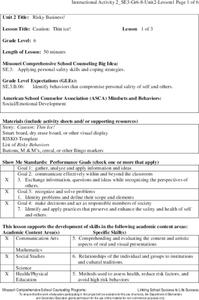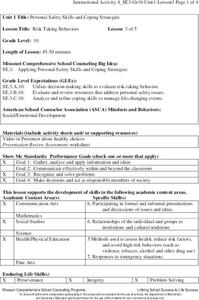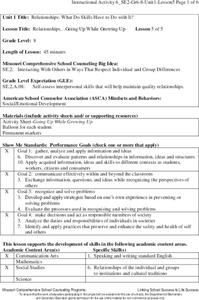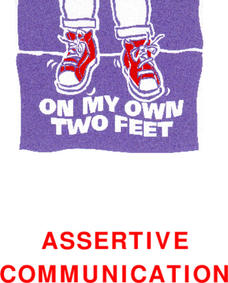Curated OER
What Can I Do?
Students identify feelings and learn how to handle conflict. In this character education lesson, discuss what to do when a friend is feeling sad and develop positive ways to handle negative feelings.
Curated OER
Contraceptives: Which Work Best?
Students discover human health by identifying contraceptive methods. In this sexual health lesson plan, students discuss the different methods used to prevent births and STD contraction. Students read assigned text which describes each...
Curated OER
Growing on My Own, Kids on the Grow
Students participate in an after school program that promotes critical thinking, concern for others, recognizing differences, accepting differences, self-motivation and personal safety. They cover how kids develop, expressing different...
Curated OER
You Can Stop!!
Pupils analyze smoking behavior based on peer pressure. For this health lesson, students read and complete worksheets on the internet concerning the behaviors associated with smoking. They summarize what they have learned by...
Curated OER
Understanding Self-Injury
Young scholars brainstorm about the topic of self-injury, then read a fictional letter and discuss the issues involved. In this health lesson, students select possible responses from a set of cards and determine the effect of the...
Curated OER
How Do Words Feel?
Students discuss the difference between harsh words and soft words, and how words feel. They feel various mystery materials such as sandpaper, or cotton, and decide if the materials would describe a word that is harsh or soft.
Curated OER
Expressing Feelings
Students practice pantomime movements. In this body awareness lesson, students discover how to convey emotions through physical movements. Students practice conveying happiness and sadness through...
Curated OER
What Can I Do?
Here is a good way for children to identify ways to handle conflict. They discuss the connection between feelings and conflict. Everyone listens to a story about a conflict between two friends and they discuss what they could have done...
Whole Person Associates
Teen Self Esteem Workbook
Happy teens are healthy teens! Pupils embark on a self-reflective journey using a series of assessments and discussions to promote personal development. The lessons focus on identifying low and high self-esteem attitudes and behaviors,...
Missouri Department of Elementary
Putting on Armor
Middle schoolers learn how to protect themselves from risky behaviors with a lesson that has them role play several scenarios and demonstrate ways that they might do to stay safe. Class members then use what they have learned to build a...
Missouri Department of Elementary
Fatal Accident
While there may not be any ghostbusters in the neighborhood, there are plenty of emergency response agencies ready to give support if something is amiss. To that end, instructors invite a member of an emergency response agency to address...
Missouri Department of Elementary
What are Comfortable (Good) and Uncomfortable (Bad) Feelings?
Two puppets open a discussion about comfrotable and uncomfortable touches. Scholars add to the discussion information they remember from a previous lesson, then delve deep into three problem-solving safety rules, and explore...
Department of Education (Ireland)
Understanding Influences
"Understanding Influences," a richly detailed, carefully scaffolded unit, asks middle and high school scholars to examine how internal and external factors like friends, media, and society influence their attitudes and...
Bully Free Systems
Bully Free Lesson Plans—Eighth Grade
Middle schoolers are likely very familiar with the concept of bullying and cliques. Discuss their experiences and brainstorm ways to handle peer conflict and feelings of exclusion with a poem that focuses on bullying, and a second lesson...
Missouri Department of Elementary
Caution: Thin Ice!
Sixth graders listen to a story titled "Thin Ice!" then partake in a whole-class discussion asking and answering questions about what was read. Scholars brainstorm risky behaviors in preparation for a game of RISKO—a game similar to...
Missouri Department of Elementary
Risk Taking Behaviors
Sophomores can be sometimes wise and sometimes foolish. The same can be said for their behaviors. After watching a presentation about risk taking behaviors, class members discuss the presentation in small groups, and then complete a...
US Department of Homeland Security
Psychological First Aide (PFA) for Students and Teachers
Listen, protect, connect! Using the resource, teachers learn how psychological first aid helps scholars adjust after a crisis or school emergency. They discover how to observe changes in pupils' school performance, listen and offer...
Missouri Department of Elementary
What Is Important to Me?
Pupils complete an activity sheet to determine what values are most important to them. They then discuss their responses with partners before sharing the results of the discussion with the class.
Missouri Department of Elementary
Relationships…Going Up While Growing Up
The final lesson in a series of five that focus on developing the interpersonal skills required to develop and maintain positive relationships asks class members to identify their best friend-making skill. Individuals share these claims...
Department of Education (Ireland)
Assertive Communication
Assertive communication is an acquired skill. Teaching young people to ask for what they need and to believe that they have a right to ask is at the core of a unit on assertive communication. Over the course of the unit, middle and high...
Department of Education (Ireland)
Consequences
11 lessons, designed to be used in consecutive order, ask middle and high school scholars to consider the effects of various drugs and the consequences of taking them for themselves and their families. They also develop the communication...
Curated OER
What's important? Knowing your facts, yourself and your role models
Third graders review safety rules about alcohol, tobacco and medicines. They learn healthy alternatives to using alcohol, tobacco and medicines. They recognize healthy and unhealthy choices
Curated OER
Character Traits - Who are We?
Sixth graders examine character traits. In this character education lesson, 6th graders set goals to strengthen particular personal character traits. Students watch their instructor model the character trait journaling strategy prior to...
Curated OER
Rates of Puberty Change
Eighth graders investigate the reasons for why individuals go through puberty at different times and rates. They conduct a personal worth role play to encourage diversity and self-acceptance. Group discussion is used for scaffolding the...
Other popular searches
- Mental and Emotional Health
- Mental Emotional Health
- Social and Emotional Health
- Social & Emotional Health
- Anxiety Emotional Health
- Social Emotional Health
- Emotional Health for Pre K
- Emotional Health for Prue K
- Anxiety + Emotional Health
- Mental / Emotional Health
- Mental Emotional Social Health
- Mental Emotional Health Fear

























